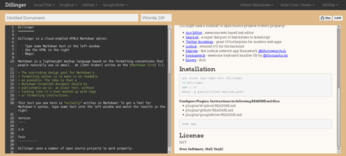Dillinger: Markdown Editor Done Right

Productivity Sauce
It seems that writing a markdown text editor is a popular pastime for many developers: hardly a day goes by without yet another markdown editor popping up somewhere on the web. Fortunately, not all of them feel like a weekend project waiting to be abandoned. Take Dillinger, for example. This web-based Markdown editor has been around for a while, and its developers continue to improving it at a steady pace. At first sight, Dillinger looks like just another Markdown editor. Its main window is split into two panes: one for editing and one for previewing the formatted text. However, Dillinger features several creature comforts that most users find handy. For starters, the editor has a word count feature, an essential tool for most writing professionals. The auto-save feature (enabled by default) ensures that you won't lose your work, and you can customize the editor's appearance by selecting one of the many available themes.

You can open existing Markdown files in the editor as well as create new ones. Better still, the editor supports several popular services, including Dropbox, Google Drive, and GitHub. When you link the editor to any of these services, you can open files, edit them, and save them back to the linked service. In addition to the standard Markdown, the editor also supports GitHub Flavored Markdown as well as HTML. Commands tucked under the Utilities menu allow you to export the currently opened file in the Markdown, HTML, and PDF formats.
Instead of using the hosted version of Dillinger, you can opt for installing it on your own server. You can find the installation instructions at the project's GitHub repository.
comments powered by DisqusSubscribe to our Linux Newsletters
Find Linux and Open Source Jobs
Subscribe to our ADMIN Newsletters
Support Our Work
Linux Magazine content is made possible with support from readers like you. Please consider contributing when you’ve found an article to be beneficial.

News
-
New Linux Botnet Discovered
The SSHStalker botnet uses IRC C2 to control systems via legacy Linux kernel exploits.
-
The Next Linux Kernel Turns 7.0
Linus Torvalds has announced that after Linux kernel 6.19, we'll finally reach the 7.0 iteration stage.
-
Linux From Scratch Drops SysVinit Support
LFS will no longer support SysVinit.
-
LibreOffice 26.2 Now Available
With new features, improvements, and bug fixes, LibreOffice 26.2 delivers a modern, polished office suite without compromise.
-
Linux Kernel Project Releases Project Continuity Document
What happens to Linux when there's no Linus? It's a question many of us have asked over the years, and it seems it's also on the minds of the Linux kernel project.
-
Mecha Systems Introduces Linux Handheld
Mecha Systems has revealed its Mecha Comet, a new handheld computer powered by – you guessed it – Linux.
-
MX Linux 25.1 Features Dual Init System ISO
The latest release of MX Linux caters to lovers of two different init systems and even offers instructions on how to transition.
-
Photoshop on Linux?
A developer has patched Wine so that it'll run specific versions of Photoshop that depend on Adobe Creative Cloud.
-
Linux Mint 22.3 Now Available with New Tools
Linux Mint 22.3 has been released with a pair of new tools for system admins and some pretty cool new features.
-
New Linux Malware Targets Cloud-Based Linux Installations
VoidLink, a new Linux malware, should be of real concern because of its stealth and customization.
